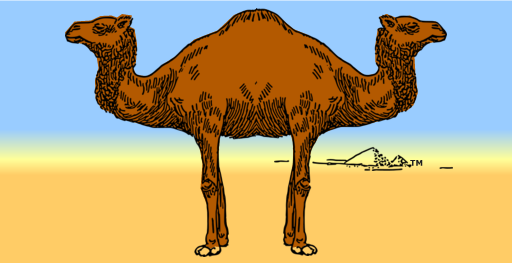
About Name Origins
About:
Palindromes Palindromedary HistoryMy first thought for naming the future book was Palindrome Dictionary. Then I glanced at Roget's Thesaurus. Yeah, needs a catchier name. I checked the etymology of palindrome and soon derived palindromedary. It stuck. Only months later did I discover it was not original.
The first recorded use of the word I could find was in Word Ways, the Journal of Recreational Linguistics, November 1988. It appeared in an article entitled "Palingroans and Amalgrams" written by Lee Sallows . I take this as an authoritative source. Lee Sallows created the word palindromedary and drew the first image of the two-headed dromedary it names.
Others have extended the concept. Ursula K. LeGuin wrote a poem about a palindromedary and sketched an image, dated February 2009. Somewhat earlier, on July 9, 1995, New York Times writer William Safire wrote a short article entitled "Palindromedaries" in which he admitted an addiction to anthologies of palindromes. He mentioned the latest book and worked a number of palindromes rather seamlessly into his review.
Neither LeGuin nor Safire commented on where the inspiration to use the word palindromedary originated. LeGuin's sketch is similar to Sallows', and both seem derived from the logo employed by Camel brand cigarettes. It seems possible to me that LeGuin and Safire could have independently conceived of the word and used it, without doing the necessary research to establish originality. I'm guilty of the same lapse.
I mention all this out of respect for the work of those who preceded me. Franklin's Palindromedary only adds a new dimension to the concepts that Sallows, Safire and LeGuin expressed years ago. Thank you.
Ananym, Reversal, Drow?
When Dave Morice wrote "The Dictionary of Wordplay" he codified the language of wordplay. Not one to play preferences, he included all terminology in use or ever used. That's why the entry for reversal notes that the term "has had more names than any other."
As defined, a reversal is "a word or phrase that spells another word or phrase in reverse". This pattern is so common in English that I wanted a separate list of these words for the Palindromedary. I also find these words to be very useful in composing palindromes. The group needed a name, like palindrome, but reflecting the significant difference.
At the time, I was ignorant of Morice's dictionary and the rich history of terminology for this form of wordplay. So I took a stab at creating a word of my own. Lexidrome is what I chose. Lex means word in both Greek and Latin. Drome is an ancient reference to camel races and the root of dromedary. As a word race, it made a kind of sense to me. I also found the word in use by cartographers. To them, lexidrome means map runner, and refers to a straight line on a Mercator projection. As with palindromedary, my efforts were not unique.
I tend to research a topic gradually, evolving my search strategy over time. After deciding to launch the Palindromedary as a website, I ran another search for reversal words. That's when I stumbled onto Morice's dictionary and placed an order for a copy.
When it arrived I was agog at the long list of words in use for a reversal. Somehow I needed to make a choice and pick just one term to use. After some consideration, I wrote a list of traits I wanted for my preferred term.
First I ranked the terms by apparent usage as indicated by Google search results. I discarded those terms with few results and kept the ones with thousands. Any term that appeared in multiple, well-known online dictionaries also made the short list. Then I checked the etymology of each term. If that investigation seemed to indicate a very different meaning for the term, I dropped it. Lastly, I noted how each term fared in the Palindromedary. I counted the number of splits and looked at the words matching each split. My goal was to assess how much potential the term had in a palindrome.
In the end, I settled on ananym. I like its etymology, how it looks, and that it has quite an interesting potential in palindromes. I even composed a couple of short ones just to confirm my hunch. While I understand that reversal is possibly the most accurate term, it just screams mundane.
